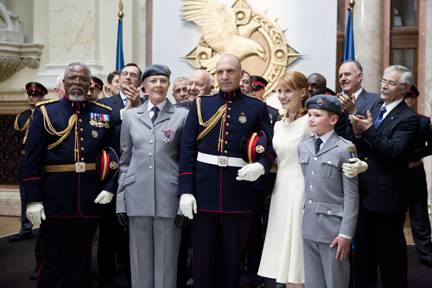Coriolanus
(R)
 Ralph Fiennes takes on acting and directing duties in Coriolanus, a Shakespearian tragedy based on actual Roman leader Caius Marcius Coriolanus.
Ralph Fiennes takes on acting and directing duties in Coriolanus, a Shakespearian tragedy based on actual Roman leader Caius Marcius Coriolanus.
Fiennes makes his directorial debut and takes on the title character. If you’re familiar with Shakespeare then you know that Coriolanus will be plagued by a tragic flaw. But Coriolanus’ flaw is not as easily pinpointed as Hamlet, for instance. Hamlet is indecisive and unreadable in character at times, whereas Coriolanus is much the opposite. He is fiery, passionate, decisive, and a bit opaque. He doesn’t hide how he feels. He doesn’t waste time with inner struggle. If anything, it seems that Coriolanus is, “above all,” true to himself. And that gets him in trouble.
Caius Martias is considered to be “chief enemy” to the people, despite his bravery and hard-fought victories. He protects the people from the Volscians, who are in dispute with the Romans over the borders and threaten invasion. But Coriolanus’ efforts lie more in his own desires, not those of the people that he is assigned to protect. He sees the people as “fragments” and cares little about their unrest. His self-interest incites hate and riots.
Volumnia (Vanessa Redgrave), Coriolanus’ mother, even recognizes her son’s joint pursuit of both greatness and hatred. “You might have been more the man you are with striving less to be so,” she says. Redgrave gives a powerful performance as the conflicted Volumnia and is aided by Virgilia (Jessica Chastain), Coriolanus’ wife, in her attempt to control and corral Coriolanus’ career path and emotions.

Coriolanus is in it for the game. He rallies his troops with his fearlessness and willingness to use himself as a weapon. “Make you a sword of me,” he shouts. He seeks his enemy Tullus Aufidius (Gerard Butler), leader of the Volscians, who is “a lion that he is proud to hunt.”
While that would make a good story itself, the plot doesn’t pursue that path. The people of Rome are swayed by emotion themselves and easily convinced that Coriolanus is not seeking their best interest. Two Roman Senators, Sicinius and Brutus, play with the people’s opinion and force Coriolanus into exile. It’s an explosive moment of the film where Fiennes takes over the screen and never looks back. There’s violence in his eyes, venom in his tongue, and indignation in his heart.
Shunned by his people, Coriolanus joins the Volscians on a warpath for revenge and control of Rome. Menenius (Bryan Cox) calls Coriolanus a “dragon” with “no more mercy in him than there is milk in a male tiger.”
The majority of the plot is given to you up front in Coriolanus so you won’t see many surprises in terms of the sequence of events. The power here is built into the performances. Fiennes shines above all in his intensity. He captures a man plagued by betrayal, whose loyalty to himself never inspires and captures the loyalty of others to him. Redgrave, Butler, Chastain, and Cox all bring well-rounded performances to the film. Butler’s Aufidius is quiet and steady in his plotting, and contrasts the fiery passion and unbridled raw emotion of Fiennes’ Coriolanus. Gods may fall, but Coriolanus is only a god in his mind. His fearlessness cannot replace his fallibility and, thus, his tragic fall is inevitable.
3.5/4 stars
Coriolanus is now playing as the feature film at the Art Theater.








